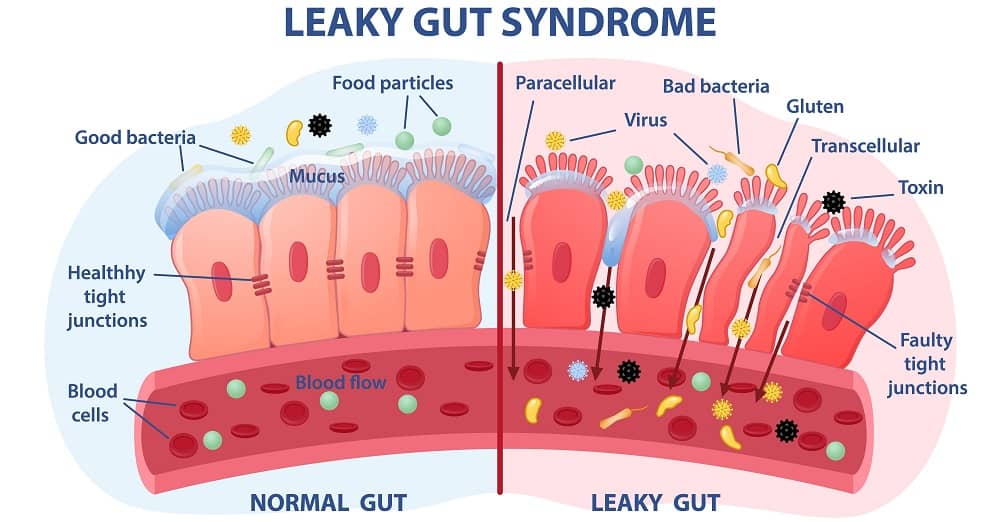Do you feel bloated even when you don’t eat a lot? Have you been struggling with food sensitivity, skin problems, and extreme fatigue lately, and you don’t know what’s causing it? If so, you might need to consult a doctor, as you could be suffering from a digestive disorder—leaky gut syndrome, in particular.
There’s no need to be alarmed, as there are various measures you can take to better manage this condition. Nowadays, there are many reliable sources for information and supplements to help you cope better, such as Bionuhealth.com and other similar sites. But before you jump into those, it would benefit you to know more about the condition.
Leaky Gut Syndrome: What To Know
Generally, leaky gut syndrome (LGS) is recognized in the medical field to be a symptom, not a digestive disorder in itself. It is an indicator for a much more severe digestive condition, and it should be addressed appropriately, as it could cause great disadvantages when neglected.
To better know how you can deal with LGS, you must first understand what it is. Here are some important facts to help you understand it better:
- Otherwise known as increased intestinal permeability, leaky gut syndrome is distinguished as a digestive condition that affects the lining of the intestines. It is characterized by gaps in the intestinal walls that enable bacteria, viruses, and other harmful toxins to enter the bloodstream.
- Due to these gaps, the intestinal walls may have a hard time separating detrimental bacteria and toxins from food nutrients and keeping them away from the bloodstream. Consequently, the openings may become wider and allow food particles and bacteria to pass through.
- There is limited data about leaky gut syndrome, and one of the major reasons for that is that most clinical studies focus on its correlation to other digestive disorders rather than its causes and solutions.
Causes Of Leaky Gut Syndrome
Despite the continuous efforts of medical experts and specialists to counter the negative effects of LGS, many people still have a hard time dealing with it. Some may think that this condition is a simple one, but you should know that LGS could have a significant impact on your overall health and wellness.
In particular, people suffering from leaky gut syndrome may experience issues with their gastrointestinal (GI) tract, skin, and eating patterns. They’re also more likely to have eating difficulties and to feel bloated for a majority of the time.
Some of the most common causes of LGS include the following:
- Dysbiosis or bacterial imbalance in the gut
- Poor diet or unhealthy eating patterns
- Toxin overload
- Excessive sugar intake
- Alcohol abuse
- Long-term use of non-steroidal anti-inflammatory drugs (NSAIDs)
- Nutrient deficiencies
- Yeast overgrowth
- Poor gut health
Signs Of Leaky Gut Syndrome
Now that you have a basic understanding of what LGS is, the next thing you may want to know are the red flags to watch out for. Here are some of the most common signs of leaky gut syndrome.

- Irritable Bowel Syndrome (IBS)
One of the most common signs of LGS is issues in one’s bowel movement. Also known as spastic colitis, nervous colon, and mucous colitis, irritable bowel syndrome (IBS) is a long-term GI disorder that could cause extreme discomfort. People struggling with IBS may also encounter the need to urinate often, bad breath, muscle aches, persistent fatigue, headaches, and for women, an irregular menstrual cycle.
- Bloating
Aside from irritable bowel syndrome, another common symptom of LGS is abdominal bloating. Some of the potential causes of bloating may include infection, fluid retention, irritable bowel syndrome, and poor diet. Although this might be a harmless condition for some people, feeling extremely bloated may cause discomfort. Fortunately, bloating can be treated at home with natural remedies.
- Diarrhea
Diarrhea is considered one of the most common digestive issues. While cases of diarrhea range from mild to severe, it could lead to life-threatening scenarios when left untreated. This condition is mainly characterized by watery or loose stools. Although such inconsistency in one’s stool may seem common at certain points, abnormally loose stools may indicate other severe digestive disorders, including leaky gut syndrome.
In most cases, the presence of bacteria, viruses, harmful toxins, and parasites may lead to diarrhea. When dealing with diarrhea, it would be best to consult a doctor immediately to avoid worst-case scenarios.
- Seasonal Allergies
If you’re struggling with a permanently runny nose, itchy eyes, and frequent sneezing, you may be suffering from seasonal allergies. This condition is widely recognized as the body’s reaction toward detrimental substances. In particular, it’s your immune system reacting to things within your body that it perceives to be infectious or harmful.
Though this is not a dangerous condition in itself, if you notice that you have this along with other symptoms included in this list, you may have reason to believe it’s a sign of leaky gut syndrome. Your immune system may have released antibodies to combat the bacteria that entered through your intestinal wall.
- Autoimmune Disease
Leaky gut syndrome is commonly connected with autoimmune diseases, such as lupus and type 1 diabetes. As mentioned above, because LGS allows bacteria to enter through the gut, the immune system releases antibodies to fight the perceived threat. In some cases, this may lead to swelling and inflammation, and the immune system might overcompensate in an attempt to protect the body. This leads to it essentially attacking itself, which is the main cause of an autoimmune disease.
Tips For Better Recovery From Leaky Gut Syndrome
Since there isn’t as much information about leaky gut syndrome available, it may be challenging for most people to cope with the symptoms and find a way to recover. However, while research is still being conducted on the condition, there are several things you can do to help you handle the situation better.
For instance, it always helps to keep your health in good condition and take care of your gut to prevent LGS and its symptoms from worsening. You should also consult a doctor and seek professional help, especially if the symptoms are causing a lot of discomfort or interfering with your daily life.
Here are some other simple yet efficient ways you can help yourself recover from leaky gut syndrome.
- Follow A Balanced Diet
Because the problem lies in the gut, it’s only natural that you prioritize your digestive health. Pay attention to your diet and eating habits, as these could determine whether your condition will improve or worsen over time.
In addition to making sure that all your food is clean and free of bacteria and toxins, you should choose food that’s nutritious and that can benefit your overall health. In particular, if you are suffering from LGS, you should consider selecting foods that are rich in antioxidants, vitamins, minerals, and plant fibers, as these can help optimize your gut microbiome.
You may also want to consider the following tips to have balanced eating habits:
- Avoid too much consumption of processed foods, such as frozen meals, snack foods, crackers, chips, instant rice, sugary meals, and cereals.
- Limit your intake of sugar, alcohol, and fat.
- Eat more fruits, vegetables, nuts, legumes, and whole grains, as they’re rich sources of fiber.
- Eat fermented food, such as kimchi, miso, and sauerkraut, as these can contribute good bacteria that can help restore the balance of bacteria in your gut and promote better digestive health.
- Get Sufficient Sleep
Aside from better nutritional intake, it’s also important for you to acquire a sufficient amount of sleep so you can better recover from leaky gut syndrome. Getting enough restorative sleep at night could significantly improve your digestive health and bolster your gut microbiome.
Generally, if you’re constantly lacking sleep or have poor quality of sleep most nights, this could negatively affect the normal balance of gut bacteria, the gut linings, and the immune system. Loss of sleep could also affect the body’s natural circadian rhythm and sleep-wake cycle. Consequently, this may disrupt the gut microbiome and decrease the production of good bacteria in your body. Thus, you should aim to get enough sleep every night and take measures to ensure better sleep quality.
- Take Supplements
Along with the above tips, you may also want to take supplements to help your body recover better. However, you shouldn’t take just any supplements you read about online; always make sure to consult your doctor and ask for their approval and prescription to avoid compromising your health.
There are several options that may be presented to you, and among these, probiotics have proven to be beneficial in maintaining a healthy gut microbiome. They’re usually formulated in such a way that allows them to target your intestinal lining and help reverse the symptoms of leaky gut syndrome. In particular, Lactobacillus rhamnosus GG (LGG) is among the best probiotic bacteria that could help treat the symptoms of LGS and restore gut barriers.
Final Thoughts
Since leaky gut syndrome isn’t a common condition, many people don’t have much knowledge about it. And without proper understanding of LGS or any idea of how to spot the early signs of it, it’s a significantly more difficult experience for people to go through.
Now that you’re equipped with the information given above, you can better handle the condition or help anyone you know who may be struggling with it. However, you should also make sure to seek help from a doctor or licensed physician, in addition to obtaining information from credible online sources.








